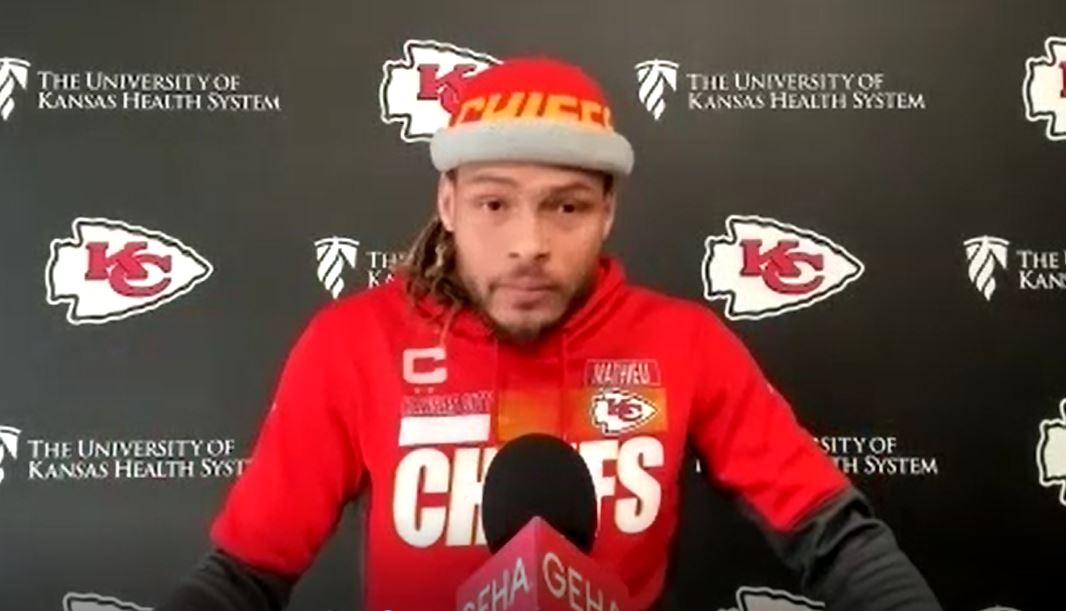KANSAS CITY, Mo. — By the time football players reach the NFL, their jersey number usually becomes special to them. Some players have worn the same number since their first snap on a football field. Even if there isn’t special significance the first time they pull on their jersey, it eventually becomes a part of them.
New Chiefs wide receiver Xavier Worthy has been connected to the No. 1 long before he became a first-round draft pick. During his sophomore season at Central High School East in Fresno, California, Worthy caught just 10 passes for 259 yards and three touchdowns in a season cut short by injury. The next season, however, Worthy exploded on the scene.
“I wore No. 1 my junior year and (that) was kind of like when I started popping out onto the scene,” said Worthy, who caught 55 passes for 992 yards and 16 touchdowns that season, leading Central East to a 15-0 season and its first CIF Division 1-AA state title. “So No. 1 kind of just been my number after that. I just wanted to take it with me everywhere I went.”
Each of Kansas City’s seven draft picks in 2024 has a meaningful relationship with the number on their Chiefs’ jersey, even if it’s a relatively new connection.
Changing Numbers
Except for Worthy, each member of the Chiefs’ draft class is wearing a different number than they did in college. Issues with jersey numbers can arise when players change teams, no matter how much star power the player holds. For example, when Joe Montana was traded to Kansas City in 1993, his iconic No. 16 was retired in honor of Len Dawson. That prompted Montana to wear No. 19 with the Chiefs.
Patrick Mahomes wore No. 5 at Texas Tech but when the Chiefs drafted him that number belonged to kicker Cairo Santos. There are options for players to acquire numbers from each other but that rule also requires the player to pay for the cost of change, specifically for fans who want to swap for the new number and for retailers to discard their outdated jerseys.
Mahomes didn’t want to take No. 5 from Santos, so he settled on No. 15.
“It still has the No. 5 in it a little bit,” said at his rookie minicamp in 2017. “At the same time, I was No. 15 during my freshman year of basketball so I went back to that. I wanted to make my own number and do a new thing in this next chapter in life.”
Like Mahomes, second-round draft pick Kingsley Suamataia also reached back to his high school days for his NFL jersey number. He wore No. 78 at BYU but, just like Montana and 16, that number has been retired by the Chiefs in honor of Pro Football Hall of Fame linebacker Bobby Bell. Coincidentally, Suamataia turned to a Pro Football Hall of Fame tackle for his number.
“That was my high school number,” Suamataia explained. “I chose 76 in high school because of Orlando Pace. That was my favorite O-lineman growing up, so I didn’t know better than to go back to 76.”
It doesn’t matter that Pace took his last NFL snaps just weeks before Suamataia turned 7 years old — he always knew he was going to be an offensive tackle.
“Most definitely,” he said with a laugh. “Yeah, most definitely.”
Tight end Jared Wiley, the team’s first of two selections in the fourth round, also revisited his high school number. He wore No. 18 at Texas, then moved to No. 19 at TCU. Again, another Pro Football Hall of Fame member, defensive back Emmitt Thomas has No. 18 retired in his honor in Kansas City. Wide receiver Kadarius Toney has No. 19.
“I wore 12 in high school,” said Wiley, who wore No. 12 as a quarterback for Temple High School in Temple, Texas. “So it kind of was like a – it felt like a full circle moment for me. Just kind of where everything started.”
Wiley doesn’t remember why he chose 12. “I was just like, it looks cool,” he explained. Maybe it had something to do with Tom Brady wearing 12. Regardless, it felt like a special number to him then and now.
“I’ve kind of achieved the goal that I ultimately have for myself,” Wiley said. “Everything’s just now getting started as far as this aspect, but definitely whenever I saw 12 was available, I have kind of like a close connection with that number.”
All in the Family
When it came time for safety Jaden Hicks and offensive lineman Hunter Nourzad to choose their jersey numbers with the Chiefs, the duo decided to keep it in the family.
Hicks wore No. 25 at Washington State, but he didn’t think twice about his second choice.
“My dad, he was 21 in high school, that was his favorite number,” Hicks explained. “And it’s a pretty religious number as well. Seven and three are pretty religious numbers in the Bible and so I really take account on that. That’s a cool thing that I got (it).”
His father, Lamont, is a probation officer in Las Vegas and a partner in the Game Changers Sports Academy with former NFL defensive back Rodney Rice. The academy provides athletic training, academic support and mentorship for at-risk youths in Las Vegas. Lamont Hicks was a safety and running back in high school and played linebacker at UNLV from 1993 to 1998.
Nourzad also honored his family by selecting No. 60 as his new number. He wore No. 64 at both Cornell and Penn State, but offensive tackle Wanya Morris currently wears that jersey.
“It was my grandfather’s number, so that’s why I (chose it),” Nourzad said.
Nourzad’s grandfather was an All-American at Wharton County Junior College in Wharton, Texas. He says he was close to his grandfather when he was younger, and there’s a football connection handed down to him through his grandfather and his mother Jamie.
“He made sure that football was important in my mom’s life, and my mom made sure that football was important in my life,” he said.
A Rich History
Chiefs sixth-round draft pick Kamal Hadden has a long history with No. 17. He wore No. 29 at Independence Community College, and then No. 13 and No. 5 at Tennessee. Those numbers were already claimed in Kansas City, which made going back to his high school uniform number the logical choice.
“This is my first number of high school varsity,” Hadden said. “It’s great. You don’t see too many DBs with 17, but I feel like I embraced it. And it just kind of takes me back to my high school days where it started. So that’s really good for me.”
Hadden was given the No. 17 jersey by Fred Jackson, a longtime Michigan coach who since arriving in Ann Arbor in 1992 has served in roles including running backs coach, offensive coordinator, and associate/assistant head coach. He worked with the likes of Tyrone Wheatley and Tshimanga Biakabutuka and All-Americans Chris Perry and Mike Hart. When Jim Harbaugh first became Michigan’s head coach he didn’t retain Jackson, who went on to serve as a high school coach in Ypsilanti, Michigan.
“I wanted to say no,” Hadden said when Jackson first handed him No. 17. “I kind of was upset a little bit at first, but he was like, you know, embrace it, and he told me the history behind him wearing 17.”
Jackson grew up in Baton Rouge, Louisiana, and was a star high school quarterback in the mid-1960s. In 1968, he met legendary Alabama coach Paul “Bear” Bryant, who conveyed to him that he was good enough to play quarterback for the Crimson Tide but his skin was the wrong color. Alabama wouldn’t field its first black players until 1971.
Instead, Jackson went to the historically black college Jackson State, where two years later he was joined by Walter Payton in the Tigers backfield. Denied an opportunity to try out as a quarterback in the NFL, Jackson entered the college coaching ranks where he helped pave the way for future generations of players like Hadden.
“So I kind of just embraced it,” Hadden said. “(I) was thankful and appreciative for it, and same here (in Kansas City).”
Making a New Meaning
Of course, not all NFL players get to choose their number. At this weekend’s rookie minicamp, while the equipment staff tries to outfit players with a number of their choosing — undrafted rookie free agent guard Nick Torres managed to land No 79 that he wore at Villanova — sometimes newcomers have to make do.
Seventh-round guard C.J. Hanson wore No. 69 at Holy Cross and No. 51 at Depaul Catholic High School in Wayne, New Jersey. Those numbers currently belong to defensive tackle Mike Pennel and defensive end Mike Danna respectively.
Hanson was assigned No. 61, and he’s choosing to find a significant to connect the number to himself.
“I’ve made a meaning, actually,” Hanson explained. “My birthday is March 3, 2001 (3/3/01). So add the threes together, you get six and there you go.”
There are instances in which players can change numbers without having to pay for it. If a player is waived or released by the club and re-signs with the team, the player may choose a new number. That’s how Mecole Hardman moved from No. 17 during his first four years with the Chiefs but returned as No. 12 last season.
Hanson hopes to be reunited with his number one day. Players have a relationship with the number on their jersey.
“I would love to have 69 back but I’m not going to ask for it,” Hanson said.


